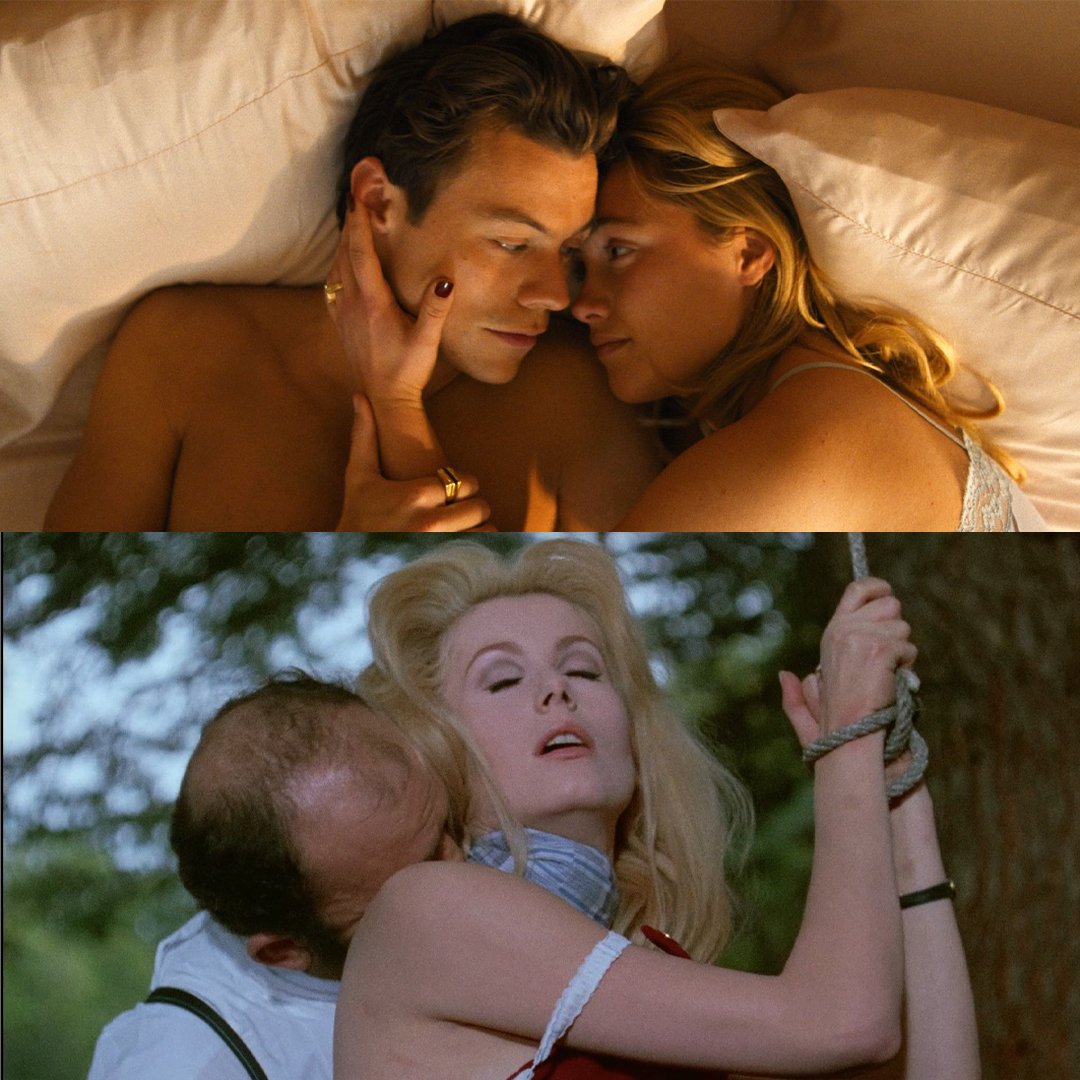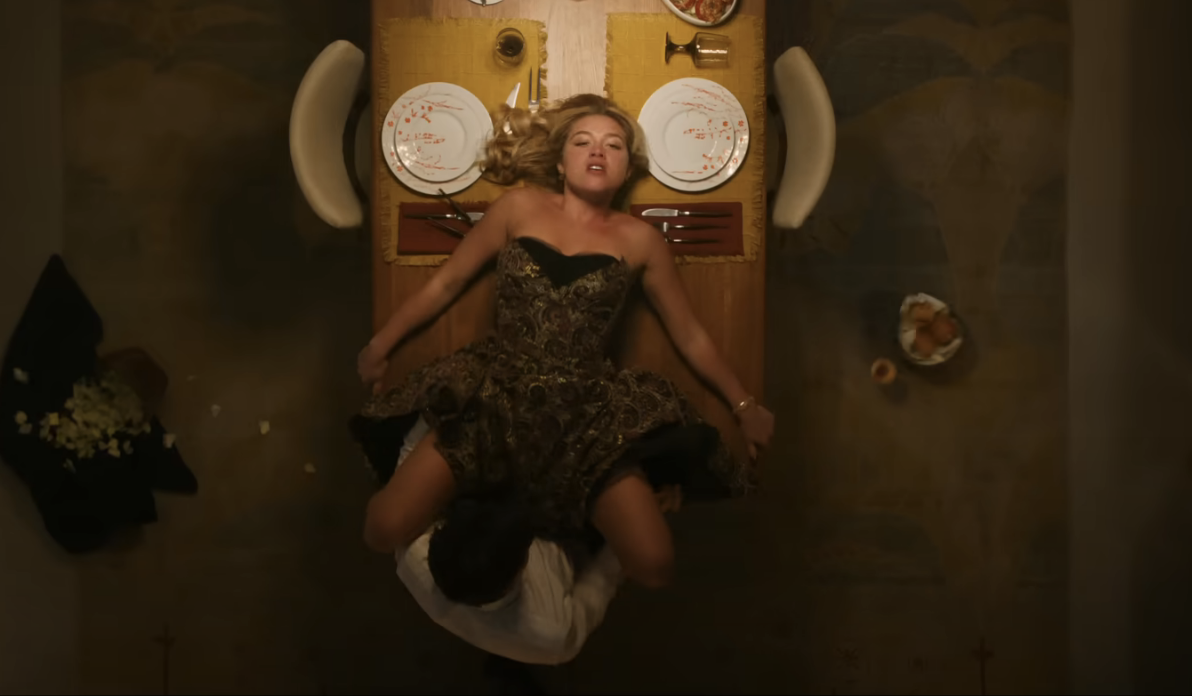Don't Worry Darling and the Sexual Politics of Control
Don’t Worry Darling (2022), the new thriller from actor-turned director Olivia Wilde, has been courting controversy long before anyone had seen the film. Initially the buzz centered around behind the scenes drama, but since the movie’s lukewarm reception by critics and audiences, the focus has now shifted toward its ambitious but ultimately silly plot and Harry Styles’ unimpressive performance. Yet one early scandal that has been overshadowed by such distinguished company as Spitgate is about the actual content of the film: a public discrepancy with how star Florence Pugh and director Olivia Wilde characterized the film’s sexual content.
In an interview with Vogue, Wilde opined on the lack of sexuality in modern movies: “I kept saying, ‘Why isn’t there any good sex in film anymore?’” She goes on to say she wanted to bring forth some of that lost cinematic sexuality in Don’t Worry Darling between the central couple of Jack (Styles) and Alice (Pugh), while also hoping she leads audiences to “realize how rarely they see female hunger” on screen. In a later interview with Variety, Wilde expanded upon the topic, while revealing what sort of titillation she was bringing to the big screen: “Men don’t come in this film, only women here… Female pleasure, the best versions of it that you see nowadays, are in queer films… In hetero sex scenes in film, the focus on men as the recipients of pleasure is almost ubiquitous.” In Don’t Worry Darling specifically, Wilde claims that the intention of the sex scenes were to “speak to [Jack and Alice’s] ferocious desire for one another.”
Soon after, a much talked about teaser trailer dropped, with most of it dedicated to Jack going down on Alice, Pugh shared a very different take on Wilde’s promotional choices and talking points. In an interview with Harpers Bazaar, Pugh commented: “When it’s reduced to your sex scenes, or to watch the most famous man in the world go down on someone… It’s not why I’m in this industry. That’s just not what I’m going to be discussing because [this movie is] bigger and better than that. And the people who made it are bigger and better than that.”
Whether or not it’s best to judge any film solely by its relationship to sex and sexuality, or if Florence Pugh’s response was a criticism of “hypersexualization” as various outlets proclaimed, she was right that Don’t Worry Darling is not nearly as much about sex as the eye-popping trailer or Wilde’s comments may have led viewers and readers to believe. Wilde’s ambitions to highlight female pleasure, portray female climax and bring sexy back to the movies are admirable, but Don’t Worry Darling unfortunately fails in the completion of either of these missions. While the film may have tried to build Jack and Alice’s relationship up from a raw sexual passion for one another, Styles’ and Pugh’s complete dearth of chemistry means the sex scenes come across as laborious and tedious rather than irresistible. Even then, a much larger problem is that the sex scenes in Don’t Worry Darling are counterproductive to the film’s ultimate message. Even if these individual sex scenes had been effective, and Pugh had been paired with an actor she had electrifying chemistry with, these scenes still would be confused and ineffective within the film’s world.
Don’t Worry Darling is set in an idyllic, 1950s-esque suburban bubble, à la The Stepford Wives, and follows Alice as she begins to suspect her simple life as a housewife is not what it seems. Eventually, both the audience and Alice learn that her insular life is actually all a hyper-patriarchal simulation, led by a charismatic leader, Frank (Chris Pine), who evokes the likeness of prominent ‘manosphere’ influencers. Alice, who in her real life is a hardworking doctor, has been forced into this simulation without her consent or knowledge by her unemployed and disaffected partner, Jack, who was radicalized by Frank through an online podcast. He made the choice for them to live in Frank’s dystopia, and within that world, he is tasked with carefully controlling the unknowing Alice. Thus, Alice’s entire life that the audience has seen up until this late reveal has not been of her making or even willing participation. At no point has she had any genuine control over her situation, relationship, or even sense of self and autonomy.
Don’t Worry Darling’s two sex scenes, one where Jack goes down on Alice after getting home from work and one where he fingers her after the two of them sneak away at a party hosted by Frank, occur very early in the film and before Alice starts to suspect something is amiss with her pastoral little life. But Wilde’s intent to showcase female pleasure falls apart under the simulation that the majority of the film is set within, distorted by its theme of control as a tool used and eroticized by men. Alice may be the partner receiving stimulation in both sex scenes, but the only way to reconcile these scenes within the context of the simulation is to focus on Jack’s motivations and pleasure from the encounters. Jack not only holds all the power within the simulation, but he solely makes all of the decisions on when, where and how pleasure is doled out. Wilde is relying on crude and surface level ideas of sexual empowerment in order to frame these scenes as feminist; that an onscreen portrayal of oral sex on a woman is inherently liberatory, and affirming the myth that receiving pleasure from a partner comes with dominance and more control.
In her Vogue interview, Olivia Wilde refers to erotic thrillers of the 1980s and ‘90s, like Fatal Attraction, as both inspirations and examples of a time in cinema where sexy movies were actually sexy. But a more apt comparison is Luis Buñuel satiric erotic masterpiece, Belle de Jour (1967). Both films are set within repressive worlds – heavy on themes of control, patriarchy and sex – and feature women who seek to break out of them. In Don’t Worry Darling a woman’s pleasure is supposedly centered, but within the context of the film the male partner’s pleasure and desires are actually what are being attended to, without the film actively commenting on this overt discrepancy. Belle de Jour tells a more complex story of sexual pleasure and control: focusing on an icy and unsatisfied upper-class housewife named Séverine (Catherine Deneuve), who, unbeknowst to her busy husband, enters the world of sex work and discovers her own desires and interests in degradation and masochism. While these subjects are typically associated with weakness, submission, and a lack of control and respect, Séverine uses these activities to learn more about herself, exploring fantasies that previously remained forbidden to her.
Of course, Belle de Jour is about much, much more than a woman discovering and harnessing her sexuality, with Séverine’s class status heavily critiqued, but ultimately her decision to pursue sex work, and in turn herself, eventually destroys the precarious bourgeois world that she had been the beautiful poster girl for. It’s bourgeois society that is ultimately shown as weak, not Séverine or her sexual inclinations. In fact, the specifics of her sexual fantasies are not relevant to the ultimate message of the film, beyond the way they are used by her to break free of her prescribed duties as a beautiful and demure ornament for her husband’s arm. While degradation and masochism are the nontraditional mode with which Séverine topples the fragile standards of normative sexual scripts, Buñuel does not rely on traditional coding of these sexual interests. Instead, he emphasizes their general subversiveness and nonspecific potential to be liberatory for the self, as well as their efficacy in exposing the fragility of a carefully controlled patriarchal society. Séverine does not escape from bourgeois constraints, and that disinterest in true liberation is one way in which the film most heavily criticizes her. However, her embrace of her own sexuality does lead to an irrevocable crack in its foundation with the dissolution of the hyper-traditional relationship structure between herself and her husband.
While Don’t Worry Darling attempts to grapple with female sexual desire and even classism, the simulation does provide material and financial comfort to those who are under its spell, it refuses to deeply engage with such topics. Empowering sex for a woman is portrayed simply as receiving oral or manual stimulation and that is as far as the film is willing to go. Unlike Belle de Jour, it never actually engaging with sex as a form of power, or control as an aphrodisiac in itself. Liberatory and feminist portrayals of sex on screen have to be about more than merely portraying a woman positioned as having control. Where Buñuel uses control, or lack thereof, to represent sexuality in general, outside of heteronormative patriarchal monogamy, Wilde only portrays female pleasure in the most surface level of ways – making reductive implications about the aesthetics of control, as well as positioning the reception of pleasure somehow being more feminist than other modes of sexual self expression or realization.
The larger problem here, and the exact issue Wilde hoped to and arguably failed at addressing with her portrayal of sex, is in the sexlessness of modern films. That Pugh’s comments on the trailer’s inclusion of sex scenes were misconstrued as criticism of being hypersexualized, similarly points to the bigger problem of the lack of eroticism in modern movie landscape. It goes beyond the simplistic portrayal of sex in Don’t Worry Darling, even if the film provides a useful and succinct case study. That a milquetoast cunnilingus scene in a trailer was, in a media landscape that still prioritizes prudishness, characterized as scandalous or highly sexual is baffling. A truly effective sex scene can become an important narrative and thematic tool for exploring female characters on deeper levels; furthering the portrayal of sex on screen beyond male centric pleasure and towards the subversive and transgressive, while also being significant to the movie’s message on the whole. The mere portrayal of sex itself is not enough for a film to be erotic and liberatory, especially when those sex scenes rely on being taken out of their context in order to be seen as somehow centering female pleasure.




